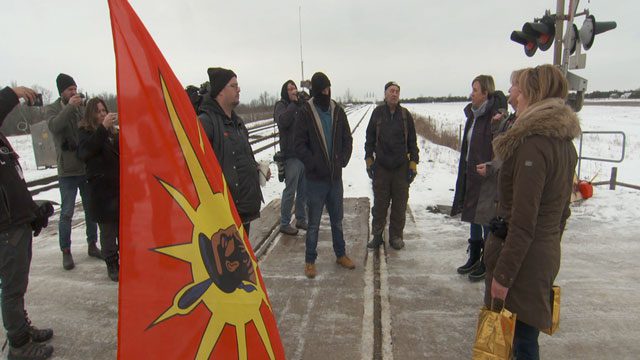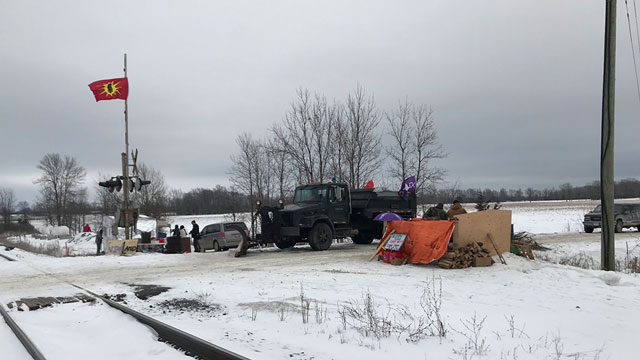
(OPP liaison officers, right, meet with Mohawk land protectors Feb. 10. Four days later the OPP said it was compelled to give CN Rail the identities of the Mohawks. Police also provided intelligence it gathered.)
The Ontario Provincial Police say a subpoena compelled it to provide the Canadian National Railway a list of Mohawks identified at the Tyendinaga rail protest who were allegedly violating a court injunction.
One expert says the collaboration between police and industry points to a troubling relationship that prioritizes Canada’s economic interests over human rights.
“CN indicated it would issue subpoenas to compel the OPP to bring this information to court. To avoid CN issuing subpoenas to multiple members, the OPP agreed to provide a witness for this purpose,” said OPP spokesperson Carolle Dionne, in an email.
“The witness attended court under compulsion of the subpoena and turned over evidence at the direction of the court. The OPP did not voluntarily provide this information.”
Dionne said CN first asked the OPP “to voluntarily provide names and information about protesters,” but the OPP refused. CN then told the OPP it would subpoena the liaison officers that had been dealing with the Mohawks on the ground since the rail protest began on Feb. 6.
On Feb. 12 CN subpoenaed Staff-Sgt. Chris Watkins, as agreed upon by the OPP.
Two days later Watkins appeared in court before Justice William Chalmers, who allowed a CN lawyer to examine the officer “in order to determine the identity of persons in breach of the interim [injunction] order” that Chalmers issued Feb. 7.
“He identified the persons who were on the tracks/right of way after the order was communicated to the protesters at 3:43 p.m. on February 8, 2020. The list is attached to the Order as Ex. 1,” said Chalmers in his Feb. 14 order.
“CN Rail has stated that its intention is to proceed with a motion to find the individuals identified by Staff Sergeant Watkins in contempt of the interim injunction order.”
Chalmers set the date for March 24. If the Mohawks are found guilty of contempt they could be ordered by the court to pay CN thousands of dollars in damages.
But Watkins gave the court more than names.
He also provided the court with intelligence the OPP’s liaison officers gathered on the demonstrators. The three-page document was redacted by the OPP to remove names of what appears to be OPP officers and sources.
The document shows the liaison officers were meeting almost daily with the Mohawks.
An associate professor in Carleton University’s Institute of Criminology and Criminal Justice believes the OPP should have contested providing any information to a private company.
“I think it’s an incredible window into the OPP playing this kind of due role. While on one hand they may be making these overtures about wanting to be respectful and have relationships; on the other the real relationship is with CN,” said Jeffrey Monaghan, who specializes in police and surveillance practices.
“They are handing over an incredible trove of intelligence that CN could never get, or would have a lot of difficulty getting this kind of intelligence on people for a civil proceeding on their own. Now the police are doing all their work for them.”
Related: How CN Rail got its injunction against Tyendinaga Mohawks
Monaghan’s research focuses on the preemptive work police do on social movements, including Indigenous movements, and says intelligence can change quickly.
“It’s not accurate all the time. It’s very fluid. It’s taken from one source and put into a databank and kind of reimagined or interpreted in different ways later on,” said Monaghan, who reviewed the OPP document.
“It’s really intimate. There’s all kinds of stuff in there that is not criminal activity that is being handed over to CN to pursue civil lawsuit, to try to bury people with debt and penalties … for standing up for Indigenous rights.
“I think they absolutely could have contested being compelled into providing information for a civil remedy.”
The OPP doesn’t agree.
“The OPP had no grounds to challenge the subpoena,” said Dionne.
APTN News asked Dionne if the OPP also felt compelled to provide intelligence on the demonstrators, as Chalmers’ order doesn’t specifically mention it.
“It was more expedient to put the information in a document of this nature than to keep separate notes and try to answer questions with respect to each protester that would be asked by CN’s counsel. The information provided in the document fits within the parameters of the subpoena,” said Dionne Wednesday afternoon.

(The demonstration halted trains, without actually blocking the tracks, between Feb. 6-24.)
Another concern is how the OPP confirmed the identities of the land protectors as some had their faces covered.
“It is unclear as to how the OPP validated the identities of those listed in the order and whether any attempt to ascertain contact information for verification of identity or – in this case – court service, could potentially affect appropriate and fair prosecution later on,” said Caitlyn E. Kasper, a lawyer with the Aboriginal Legal Services in Toronto.
The 2007 Ipperwash inquiry recommended, among other things, that OPP to take measures to ensure that communications between officers regarding tactical decisions and intelligence remain secure and not subject to interception by others.
CN is a private company but also has its own police service with the same policing powers as the OPP.
“It would appear that the sharing of information with other law enforcement agencies is not addressed in the most recent OPP Framework for Police Preparedness for Indigenous Critical Incidents, which as you are most likely aware, was the OPP’s official response to Ipperwash,” said Kasper.
The inquiry’s mandate was to examine the events surrounding the death of Dudley George, who was shot by the OPP in 1995 when land protectors occupied Ipperwash Provincial Park, which the Chippewas of Kettle and Stony Point First Nation say was stolen by the federal government in 1942 for use as a wartime army base.
It was returned to the First Nation in 2015 after a lengthy land claim battle.
Kasper also believes CN may have been able to get the identities through freedom of information laws.
“The Information Privacy Commissioner has determined that the Canadian National Railways police is a ‘law enforcement agency’ for the purpose of this section and therefore, the OPP is authorized to disclose information to them under law. It is understood in this section that disclosure of personal information is for the purpose of law enforcement,” said Kasper.
CN didn’t respond to an email for comment.
On Monday OPP arrested 10 individuals involved in the demonstrations. All were charged with disobeying a court order and mischief over $5,000, while some were charged with resisting arrest and obstruction of a police officer.










You have the right to protest, and the responsibility of dealing with the consequences. Nobody ever said civil disobedience was easy.
So guilty before a trial or anything now…yeah thats the way to handle things… Are you kidding me… Now we sit and watch the lawsuits fly…hope it was worth it OPP …shakes my head
Take note of this all you union members and stewards and officers… Insanity…true insanity…
I guess its not only the rcmp who have an honesty and integrity problem, They all seem to have one thing in common, they like to make excuses for their actions when their credibility comes into question.